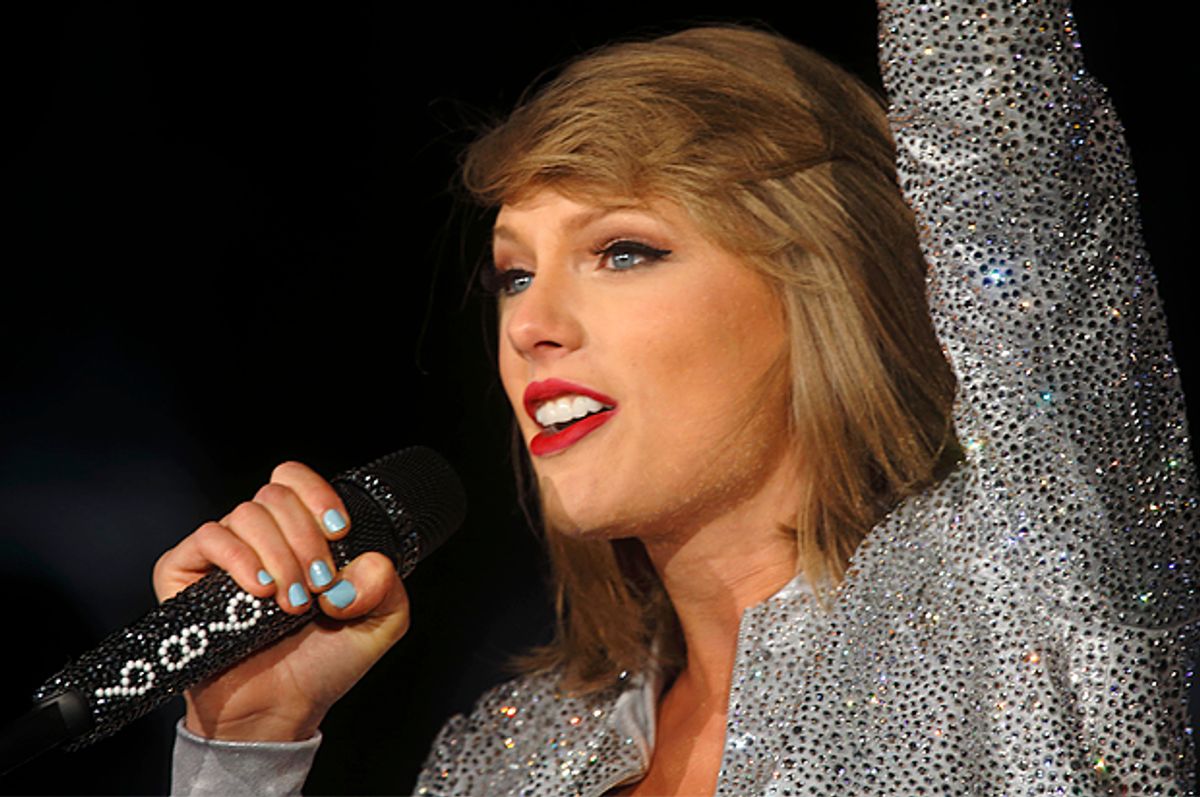There are a lot of things about Taylor Swift that drive me crazy. The rich-kid sense of entitlement. The bragging about the numerous houses. The way her finance-sector parents bought her career. The fact that her machine-made songs sound like a cash register ringing.
But Swift is one of the few musicians powerful enough to exert pressure – even just the pressure of public opinion – against the world’s biggest corporation. And here’s a place where I'll have to concede that Swift has made a real blow for artist’s rights.
The New York Times reports:
Less than 24 hours after Ms. Swift complained publicly that Apple was not planning to pay royalties during a three-month trial period of its new streaming music service, the company changed course, and confirmed that it will pay its full royalty rates for music during the free trial.
“When I woke up this morning and read Taylor’s note, it really solidified that we need to make a change,” Eddy Cue, Apple’s senior vice president of Internet software and services, said in an interview late Sunday.
Whether Swift’s heart is really in it for the working musicians is hard to tell, and lord knows this daughter of the one percent does not need the money. But Swift’s team was smart they way they framed this. “We don’t ask you for free iPhones,” she wrote in an open letter in her Tumblr page. “Please don’t ask us to provide you with our music for no compensation.”
By framing this as a battle for all musicians, and not just for Swift and a handful of other arena-rock-touring superstars who don’t need the money, Swift’s handlers were able to avoid what we could call The Tidal Mistake. That’s where the new streaming service Jay Z is hoping to get even richer from badly misfired its rollout. From Bloomberg:
Jay Z unveiled Tidal at a press conference in late March, flanked by 15 of the biggest acts in the music business, including his wife, Beyoncé, Madonna, Nicki Minaj, Rihanna, Jack White, and Kanye West, all of whom were introduced as equity shareholders. Many seemed awkward and unprepared. Another owner, Alicia Keys, quoted Nietzsche and gushed about Tidal’s cultural significance: “We’re gathered … with one voice, in unity, in the hopes that today will be another one of those moments in time, a moment that will forever change the course of music history.” There was a lot of utopian rhetoric about restoring the value of music in the digital age. Less time was spent on new features, technology, or other reasons for listeners to try—and pay for—a Tidal subscription.
So far, the Tidal launch has gone about as well as Metallica’s Lars Ulrich’s attacking illegal music downloaders: Like Jay-Z, he made this seem like a case of greedy artists vs. regular folks, and helped obscure the fact that the vast majority of musicians hoping get paid during the digital era are not living large, but simply trying to make a living.
Swift’s approach, by contrast, was great PR and effective messaging: It comes a year after she wrote in the Wall Street Journal about Spotify that, “Valuable things should be paid for. It’s my opinion that music should not be free.”
As she put it on her note to Apple:
This is not about me. Thankfully I am on my fifth album and can support myself, my band, crew, and entire management team by playing live shows. This is about the new artist or band that has just released their first single and will not be paid for its success. This is about the young songwriter who just got his or her first cut and thought that the royalties from that would get them out of debt. This is about the producer who works tirelessly to innovate and create, just like the innovators and creators at Apple are pioneering in their field…but will not get paid for a quarter of a year’s worth of plays on his or her songs.
All I can say is: She’s absolutely right here.
Leaving the messenger aside – and I still have all kinds of problems with her and the worship of her money and business dealings -- a number of problems remain.
For one thing, it would have been nice if Apple would have responded to the well-grounded complaints of musicians, artist’s rights groups and indie labels before today. Criticism of the free-trial plan was hardly difficult to find. (Or does Apple execs only listen to fellow millionaires?)
And Apple’s streaming plan, despite paying a slightly higher percentage in royalties than Spotify, is still unclear at a lot of levels. Where are the completed deals, especially with independent labels? And what happens to iTunes downloads, which have kept a number of musicians alive during this weird period as recorded music revenue has fallen off a cliff.
But for now, let’s be happy about Swift’s blow for royalty payments the same way we are for the fact that Nixon created the Environmental Protection Agency: Whatever the motivation, this is a step in the right direction. There’s still a lot we’d like to know about Apple's plan, but this change will be good for musicians at all levels.

Shares